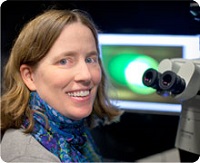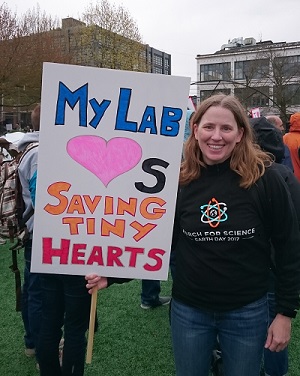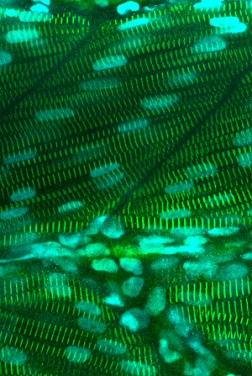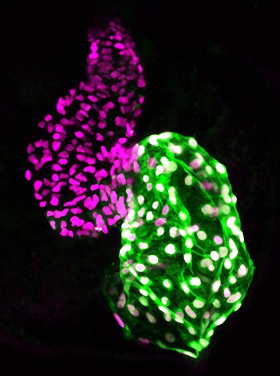Lisa Maves

1. What is your research focus?
My lab works on understanding the transcriptional and epigenetic control of cellular differentiation programs, in particular of skeletal and heart muscle cells. We want to use this insight into muscle developmental biology to better understand diseases like muscular dystrophy and congenital heart defects.
2. What current project are you excited about?
One project that I’m excited about, even though it is still in early stages, is our drug treatment and transcriptome studies of dmd fish, a model for Duchenne muscular dystrophy. This project is helping us find mRNAs that are potentially involved in muscle differentiation as well as markers to understand how dmd fish respond to new drug treatments that we have identified.
3. How long have you been working with zebrafish?
I have been working with zebrafish for almost 20 years. I started working on zebrafish when I started my post doc in Chuck Kimmel’s lab in 1998.
Getting to know you better…
4. Where were you born/where did you grow up?
I was born in Rockford Illinois and spent most of my childhood growing up in Freeport Illinois, home of the Freeport High School Pretzels.
5. When did you realize you wanted to have a career as a scientist? /What made you realize you wanted to have a career as a scientist?
My dad was a veterinarian, and I remember wanting to look at slides through the microscope when visiting his clinic as a kid. I loved how you could use the microscope to see new things. But I didn’t really know about scientific research as a career until I went to college. I was on the cross country team and some of my teammates were doing undergraduate research. I thought that sounded cool so I looked for a lab to join. Once I started in a lab I realized it was what I really loved.
6. Where did you do your undergraduate studies? Did you do research with anyone?
I did my undergraduate work at Washington University in St. Louis. I did undergraduate research in Larry Salkoff’s lab at WashU med school from my sophomore-senior years. The independence that I was given in the lab, especially for an undergraduate, was amazing, and I think that was what really allowed me to develop my love for research (and fruit fly genetics).
7. Where did you do graduate studies and with whom? What did you work on?
After undergraduate, I went to graduate school at the University of Washington and was in Gerold Schubiger’s lab. I discovered a signaling mechanism for Drosophila imaginal disc transdetermination, a process where, for example, a leg disc cell turns into a cell that makes wing tissue. Imaginal disc transdetermination had been a long-mysterious process, originally discovered through approaches of transplanting imaginal disc tissue into the abdomens of adult flies. My graduate thesis revealed that two cell-signaling pathways critical to imaginal disc development, Wingless and Dpp signaling, were instrumental pathways involved in initiating transdetermination in situ. This work provided the first genetic and molecular insight into imaginal disc transdetermination as well as insight into the maintenance and stability of cell fate.
8. Where did you do postdoctoral studies and with whom? What did you work on?
My postdoctoral research was with Charles Kimmel at the University of Oregon, where I was fortunate to receive training from some of the founders of zebrafish genetics. There I discovered that FGF signals mediate a hindbrain organizing activity. This work helped reveal that such organizing signals are used throughout the development of the central nervous system.
I then had a second postdoc/staff scientist position with Stephen Tapscott at Fred Hutchinson Cancer Research Center. There I showed that Pbx homeodomain transcription factors are required for initiation of the fast-twitch-specific skeletal muscle lineage in zebrafish. This work provides insight into how pioneer transcription factors regulate cell lineage differentiation pathways. My lab continues to study the roles of Pbx factors in muscle and heart development.
9. What other jobs have you had?
The first job I had was in high school, I worked at a movie theater. One thing I learned there was what the inside of a soda machine is like. My other job, which I’ve had for eight years, is being a mom.
Science and careers…
10. Share a turning point or defining moment in your science/career.
Getting my first NIH grant when I was in Stephen Tapscott’s lab. Even though it was a small one (an R03), it came at a critical time and allowed me to continue my work on zebrafish muscle development in the Tapscott lab.
11. If you could be present for any "Eureka" moment in history (i.e. the moment some scientific discovery was made), which moment would you choose? Why?
This is not my area of expertise, but it was very inspiring to see videos of NASA scientists at the moment of the Mars Rover landing a few years ago. It must have been amazing to be a part of such a large group of scientists that had worked so hard and then got to celebrate together when they knew the Rover landing was successful.
12. What advice would you give to someone considering a career in science/research?
2 things. 1. Don’t be afraid to reach out to other scientists. This goes for undergraduates trying to find a lab to work in, to junior faculty looking for potential collaborators. 2. Everyone experiences frustrating reviews on their grants and papers at some point. Try to take what you can from criticism and use it to keep moving forward.
13. Where do you think the next scientific breakthroughs are going to occur?
I think we will continue to see more and more creative uses of CRISPR not only for genome engineering but also for new ways of manipulating gene expression. I think we will also see more studies of cell lineage analyses and insight into what controls cell lineage, especially in zebrafish but also in mice and even in humans.
Outside of work…
14. What do you enjoy doing outside of work/lab?
Watching my daughter play soccer.
15. If you could only eat one thing for the rest of your life, what would it be?
Luna bars
16. What are you reading right now (not including research papers)?
Maria Semple’s “Today Will be Different”
17. Name a favorite song or musical piece.
The entirety of R.E.M.’s Lifes Rich Pageant
18. Favorite place you have lived or visited?
Paris, France (visited)
19. What career would you like to attempt if you could?
Basketball coach.
20. Provide a quote that speaks to you.
“Nevertheless, she persisted.”
Find her on the web here.
Below is an image captured by the featured Investigator......
|
|
 |
 |
|
"Transgenic zebrafish heart at 48 hrs, image from Kao et al., 2015." |
"At the March for Science!" | "Zebrafish larval skeletal muscle fibers" |





